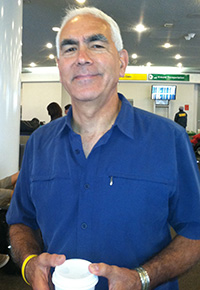 Recess is a favorite among elementary school students.
Recess is a favorite among elementary school students.
Dale Fink, associate professor of education at the Massachusetts College of Liberal Arts, explains what happens when recess is taken away for bad behavior.
Dr. Fink came to MCLA in 2006 after a career spanning 35 years in childcare, early childhood education, out-of-school time care, and research and training related to children with disabilities and their families. Among his books are Making a Place for Kids with Disabilities (2000) Control the Climate, Not the Children: Discipline in School Age Care (1995), and a children’s book, Mr. Silver and Mrs. Gold (1980).
He spent a dozen years as a teacher and administrator in preschool and school-age childcare settings in the Boston area, followed by eight years at the Wellesley College Center for Research on Women as part of a national project conducting training and research related to “latchkey children.” He edited a nationally circulated newsletter during those years, and designed and conducted training for audiences that included school principals and superintendents, as well as front-line afterschool childcare staff. In 1990, Dr. Fink became the first-ever recipient of a World Institute on Disabilities grant to study the inclusion of children with disabilities in childcare.
As co-Director of a national federal initiative during the Clinton administration called Map to Inclusive Childcare, Fink worked on strategic planning with state leaders to improve access of children with disabilities to high-quality early childhood and childcare opportunities. Later, he joined the University of Connecticut’s Center for Developmental Disabilities as part of its research faculty.
Dale has been a keynote speaker at conferences in Nova Scotia and Alberta (Canada), Sydney, Australia and at statewide conferences in Arizona, Florida, Texas, New York, Vermont, Massachusetts, and many others.
Fink teaches courses in early childhood education, special education, and Children’s Literature. In addition to his faculty responsibilities, Fink has developed courses and workshops for community-based early childhood educators, presented at a statewide STEM Summit, edited a book by colleague Anthony Gengarelly from the Art Department, edited the 2013 issue of the MCLA journal The Mind’s Eye, and delivered the featured address for ALANA’s Martin Luther King celebration.
Recess
To many children, very little that happens during a school day is more important than recess. That is why, for better or for worse, teachers in many elementary classrooms put recess on the chopping block. They threaten to take it away to encourage better focus on academics and compliance with classroom rules.
I have wondered how teachers think about this strategy of turning recess into a bargaining chip, what students think about it, and if anyone thinks it is achieving its objectives.
I designed a study that began with surveys of teachers in three school districts. Nearly 100% believed there were both physical and social benefits to recess. In spite of this, 95% of teachers of grades one through five used the practice of withholding students’ recess.
In a second phase of the study, I was able to interview third and fifth graders. Most of my interviewees were understanding of the practice. Wesley recalled, “one time I had to work on some writing and I missed the whole recess but it was very productive.” Kobe stated, “It’s not a good feeling. You see the other kids are playing and you’re on the wall. But it’s a consequence, you have to deal with what you did.”
They were understanding of teachers’ agendas, but they loved recess. They filled my notebooks with comments of what they liked to do at recess—mostly revolving around friendships and physical activities. Many wished there was an alternative to the denial of recess. Mitch said, “If it was up to me, I would let everybody go outside and find some other way to give consequences… But I’m not sure what that other way could be.”
I am still in the process of interpreting my data. But some data need very little interpretation. For instance, these words from Beatrice: “Teachers don’t remember what it’s like to be kids. They don’t remember they have made the same mistakes.”

Comments
One response to “Dale Fink, Massachusetts College of Liberal Arts – Recess”